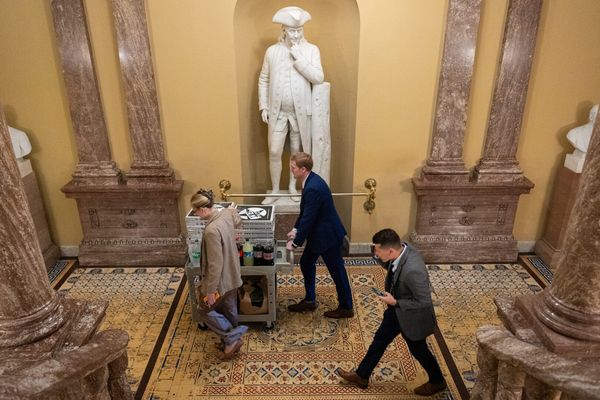
More than 65,000 people in North Carolina who believed they were eligible to vote could have their ballots thrown out nearly five months after election day, flipping the results of a supreme court election, a state appeals court ruled on Friday.
The 2-1 ruling from the North Carolina court of appeals came in response to Republicans’ months-long effort to overturn the results of the state supreme court election in November. The Democrat Allison Riggs, who currently sits on the court, defeated appellate judge Jefferson Griffin, a Republican, by 734 votes. After the election, Griffin filed a protest seeking to get around 60,000 votes thrown out.
Griffin currently sits on the North Carolina court of appeals – the body that issued Friday’s ruling. A panel of three of his colleagues heard the case.
“To permit unlawful votes to be counted along with lawful ballots in contested elections effectively ‘disenfranchises’ those voters who cast legal ballots, at least where the counting of unlawful votes determines an election’s outcome,” Judges John Tyson and Fred Gore wrote for the majority.
In a statement, Riggs said: “We will be promptly appealing this deeply misinformed decision that threatens to disenfranchise more than 65,000 lawful voters and sets a dangerous precedent, allowing disappointed politicians to thwart the will of the people.”
The election is the only 2024 race still undecided.
The state board of elections previously rejected Griffin’s request and a superior court judge upheld their decision. Friday’s ruling from the court of appeals overturned that ruling and ordered the state board to give challenged voters 15 days to prove their eligibility.
When the case reaches the seven-member North Carolina supreme court, Riggs will be recused from hearing it. Without her, Republicans will have a 5-1 majority. If the court were to deadlock, the ruling from the court of appeals would stand.
More than 60,000 of the voters challenged failed to provide either a driver’s license number or the last four digits of their social security number on their voter registration forms. Another 5,500 challenged ballots came from overseas voters who had failed to provide ID.
Republicans had filed a lawsuit making similar arguments ahead of election day last year and had it rejected. North Carolina has required the identifying information since 2004 to register to vote, but the state did not update its voter registration form until 2023.
The ruling also said that voters who had never lived in the state, grew up overseas, and cast a ballot in the state were ineligible to vote and their votes should not count. That category of people typically includes children of North Carolinians who moved abroad before they turned 18.
In a lengthy dissenting opinion, judge Toby Hampson noted that Griffin had not identified a single voter who cast a ballot who should not have been able to. Instead, he said, he was trying to change the rules around eligibility after the election.
“The diligent actions these voters undertook to exercise their sacred fundamental right to vote was, indeed, the same as every other similarly situated voter exercising their voting right in the very same election,” he wrote.
“Changing the rules by which these lawful voters took part in our electoral process after the election to discard their otherwise valid votes in an attempt to alter the outcome of only one race among many on the ballot is directly counter to law, equity, and the constitution.”
Hampson said he was doubtful that many voters would respond to a notice to prove their eligibility.
“The proposition that a significant portion of these 61,682 voters will receive notice and timely take curative measures is a fiction that does not disguise the act of mass disenfranchisement the majority’s decision represents,” he wrote.
Bob Phillips, the executive director of the North Carolina chapter of Common Cause, a watchdog group, called the ruling a “disgrace” that “could disenfranchise tens of thousands of lawful voters and invite similar challenges nationwide”.
Ken Martin, the chair of the Democratic National Committee, said the decision had “no legal basis and is an all-out assault on our democracy and the basic premise that voters decide who wins their elections, not the courts”.







